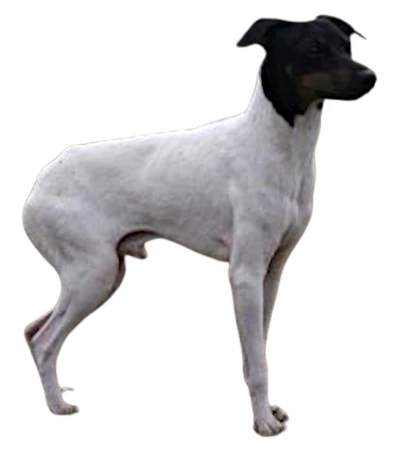
The Chilean Terrier is a small to medium-sized dog breed that originates from Chile. This dog is valued for its lively and affectionate temperament. Historically, it was bred to hunt pests and for its adaptability to various environments, making it an excellent companion dog.
The Chilean Terrier is a well-proportioned dog with a muscular and elegant stature. It measures between 30 and 40 cm at the withers and typically weighs between 6 and 10 kg. Its head is broad with a medium-sized muzzle, round eyes, and a lively expression. Its ears are semi-erect, adding to its charming appearance.
The coat of the Chilean Terrier is short, dense, and can be slightly wavy. Common colors include white, black, brown, and combinations of these shades. Regular brushing is necessary to keep its coat healthy and to prevent matting.
Males measure between 35 and 40 cm, while females are slightly smaller, measuring between 30 and 35 cm. The weight of a Chilean Terrier ranges from 6 to 10 kg, making it an ideal companion for families living in apartments or houses.
The Chilean Terrier is known for its friendly, curious, and affectionate personality. It is very attached to its family and gets along well with children and other animals. This dog needs regular physical and mental stimulation to remain happy and avoid boredom. Although it is protective, it is not aggressive by nature.
The Chilean Terrier is generally healthy, but it may be prone to certain hereditary conditions. Regular veterinary check-ups and a balanced diet are essential to maintain its health. Its average lifespan is around 12 to 15 years.

The Chilean Terrier Puppy is a small-sized dog originally from Chile, known for its lively temperament and intelligence. This active and sturdy dog has excellent hunting instincts, particularly for tracking small game. Despite its small size, it is a courageous and determined dog that adapts well to both rural and urban environments. The Chilean Terrier is also an affectionate dog, very attached to its family and protective, making it an excellent companion. However, due to its independent nature and energy, it requires firm and consistent training to channel its energy. Its coat is medium-length, dense, and relatively easy to maintain, although it does need regular brushing to avoid tangles.
The price of a Chilean Terrier Puppy varies depending on the breeder and pedigree quality. On average, you should expect to pay around 800 to 1,200 euros.
The Chilean Terrier is an energetic and courageous dog breed known for its intelligence and lively temperament. Training a Chilean Terrier requires patience and an understanding of its specific needs.
Early Socialization: Socialization is essential for the Chilean Terrier. Expose it to various environments, people, and animals from an early age to foster balanced and confident behavior.
Positive Reinforcement: Use positive reinforcement methods to encourage desired behaviors. Food rewards and verbal praise are particularly effective with this breed.
Exercise and Mental Stimulation: The Chilean Terrier needs plenty of physical exercise and mental stimulation. Interactive games, regular walks, and search activities are essential for maintaining its well-being.
Consistency in Training: Establish clear and consistent rules. Consistency in expectations will help the Chilean Terrier understand what is expected of it.
Respect for Hunting Instincts: The Chilean Terrier is a natural hunting dog. Respect this instinct while teaching it to channel its energy positively and safely.